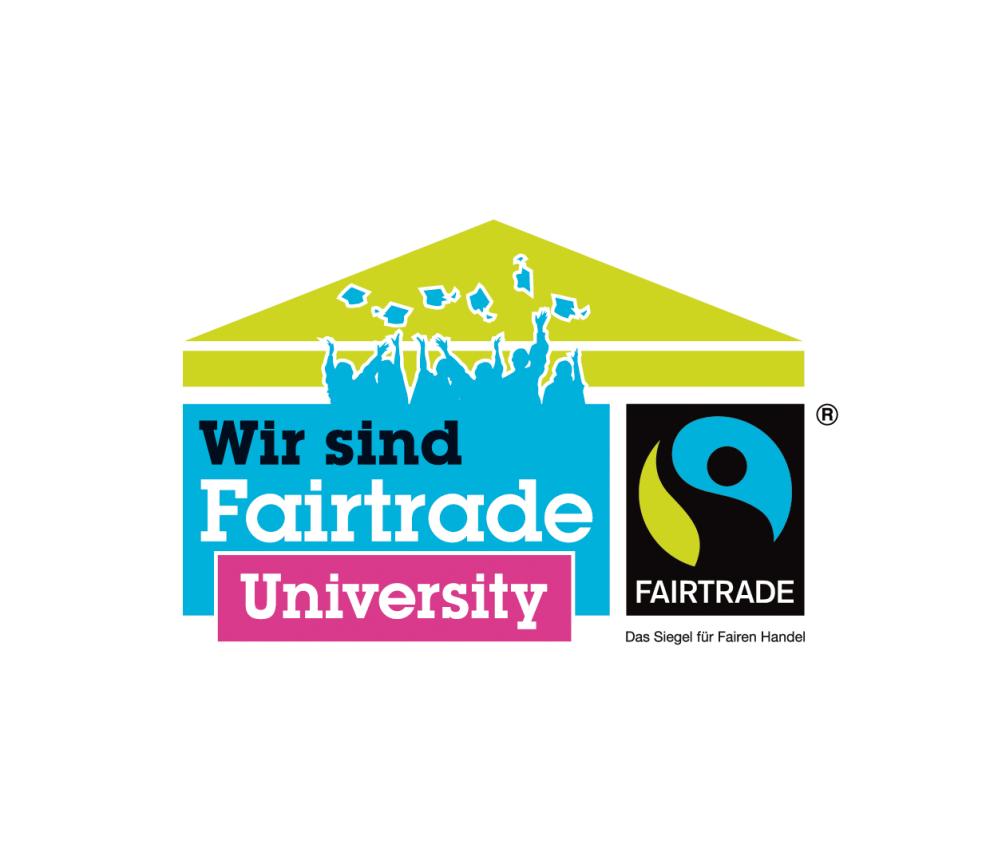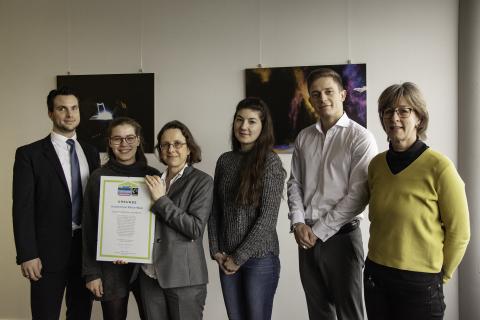Certified Fair Trade University

In October 2017, Rhine-Waal University of Applied Sciences with its two campus locations in Kleve and Kamp-Lintfort was certified as the 15th Fair Trade University in Germany and, at the same time, the first of its kind in North Rhine-Westphalia. This certification is both a distinction and an acknowledgement of Rhine-Waal University’s ongoing commitment to promoting and embodying fair trade practices. The certification was awarded by Transfair, also known as Fairtrade Deutschland, an independent initiative dedicated to spreading awareness for fair trade practices in Germany.
Rhine-Waal University again awarded as Fairtrade University in 2020
The Rhine-Waal University of Applied Sciences can once again adorn itself with the title of Fairtrade University, having already been the first university in North Rhine-Westphalia to be awarded this title in 2017. The certificate acknowledges the university's commitment to promoting fair cooperation in global trade.
Having been the first university in North Rhine-Westphalia to be awarded the title Fairtrade University in 2017, the Rhine-Waal University of Applied Sciences was now due for recertification. To do so, it had to prove that it continued to meet the five criteria - from the decision of the Presidential Board to expand the range of fair trade products on campus to events and campaigns on the subject.
The Rhine-Waal University of Applied Sciences has now provided this proof. Fair trade products will be offered in the cafeteria, at events and in the vending machines. The new university own merchandising shop contains fair clothing and numerous events on the topic of fair trade took place. The activities are coordinated by a specially formed steering group consisting of members of the Fairtrade student group in Kamp-Lintfort and Kleve, representatives of the administration, the student union and the student union.
For example, students asked for fair bags and informed about fair trade at the Mini Maker Faire in Kamp-Lintfort. At the Festival of Sustainability students organised a panel discussion on the sustainable supply chain law in Kleve. The topic is also covered in teaching. In the interdisciplinary project "Fairness and Trade", for example, students investigated whether and how the UN goals on sustainability and the principles of the Global Reporting Initiative can be applied to Fairtrade certifications (e.g. Fair Wear Foundation, Gepa, Fairtrade international) and certified companies.
With the recertification, the Rhine-Waal University of Applied Sciences confirms its commitment to fair trade. "We are proud of this award and are delighted that the great commitment of our Fairtrade student group in particular is being recognised," emphasises Professor Dr. Irmgard Buder, Professor of Renewable Energies and Electro Mobility, who is a professorial member of the Fairtrade Steering Committee. "However, we also see the title as both an invitation and an obligation to further sharpen our awareness of the issue and to work even harder at Rhine-Waal University of Applied Sciences to promote more fairness in trade", adds Chancellor Michael Strotkemper and expressly thanks the steering group for its commitment.
Other universities in North Rhine-Westphalia have followed the example of Rhine-Waal University of Applied Sciences. In the meantime, seven universities in the federal state have received awards. Throughout Germany, 30 universities now bear this title. Fairtrade universities are universities that are actively involved in the promotion of fair trade and have been awarded this title by the non-profit organization TransFair.

What is “Fair Trade”?
Fair trade means living wages for small-scale farmers and producers and better working conditions on plantations. There are a number of organisations that award fair trade seals for upholding specific standards. One of the largest and most well-known is the seal of Fairtrade Deutschland.
A certified Fair Trade University must meet five criteria: The first is an official resolution, drafted jointly by both the central university administration and the student body, to apply for fair trade certification. Second, a steering committee must be established with representatives from the student body, central administration and campus dining services to coordinate fair trade activities on campus. Third, the university must pledge to serve only fair trade products at official events and committee meetings. Fourth, fair trade products must also be sold in the campus bistro and canteen. Finally, at least two events dedicated to raising awareness for fair trade practices must be organised each semester. At Rhine-Waal University of Applied Sciences, the Fair Trade Student Group is responsible for planning and organising these awareness-raising events.
